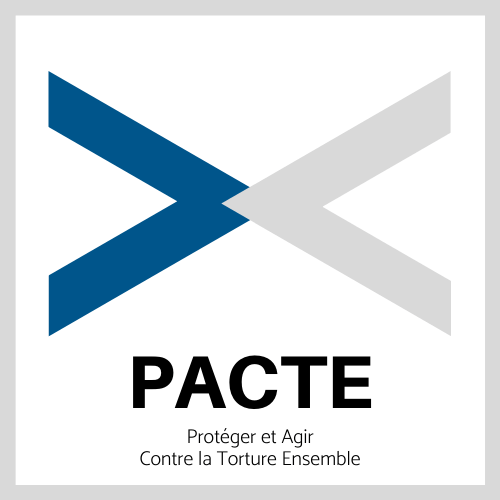PACTE
TECHNICAL SHEET
– NAME : PACTE – Prevent and Act Against Torture and Arbitrary Detentions Together
– DATES : 2020 – 2022
– BUDGET : 457 637 €
– WHAT IT’S ABOUT : Contributing to the reduction of arbitrary arrests, illegal detentions and acts of torture or other cruel, inhuman or degrading treatments in the Republic of the Congo
– AREA OF INTERVENTION : Republic of the Congo
– LOCAL PROJECT PARTNERS : Observatoire Congolais des Droits de l’Homme (OCDH), Association pour les Droits de l’Homme et l’Univers Carcéral (ADHUC), Association les Amis des Enfants (AAE), Cercle Uni Pour les Droits de l’Homme et Culture de Paix (CUDHOC), Association Horizon Futur, Association pour la Vulgarisation du Droit au Cœur de la Société (AVDCS)
– FUNDING PARTNER : European Union
– OBJECTIVES :
1. Strengthen the capacities of civil society organizations to fight against arbitrary arrests and detentions, and torture or other cruel, inhuman or degrading treatment or punishment
2. Mobilize public opinion and encourage the authorities to take measures to improve arrest and detention practices and to prevent the use of torture
3. Identify, protect and defend victims of arbitrary detention and torture or other cruel, inhuman or degrading treatment or punishment
– HOW WE INTERVENE : Targeted training (police stations, gendarmerie posts, remand centers – as far as possible), awareness-raising, consolidation of journalists’ skills, support for victims arbitrarily detained and/or tortured

WHY THIS PROJECT ?
Fifteen years after the Republic of the Congo ratified the UN Convention against Torture and Other Cruel, Inhuman or Degrading Treatment or Punishment, torture remains a common practice in the country. The lack of a definition of torture in the Congolese Criminal Code and Code of Criminal Procedure severely limits the legislative arsenal and contributes to the impunity enjoyed by torturers. The political context, which has deteriorated sharply since 2015, did not help to create an environment conducive to legislative reform on torture. In addition, the process of reforming legislative texts appears to be hampered by the numerous ministerial reshuffles that took place after the 2016 presidential election. However, the Universal Periodic Review, which took place in November 2018, marked an important period of analysis of the situation in Congo, during which many recommendations pushed the Republic of the Congo to ratify the OPCAT.
Since torture is not explicitly defined and punished in the Penal Code, its practice by the authorities and law enforcement agencies remains common in the country, mainly during arrests, in police custody and in detention. The PACTE project intervenes in a context of deteriorating socio-political climate in the Republic of the Congo and responds to a need to protect human rights, in practice and in texts.
EXPECTED OUTCOMES
The quality of the survey, documentation and advocacy work of civil society organizations continues to improve, while adopting a gender differential approach.
The awareness-raising and advocacy work carried out by implementing partners of the project with the State contributes to concrete measures of change in legislation and/or in practice.
The authorities commit to improving the prison environment.
Legal, medical, social and/or psychological assistance is given to victims. Legal proceedings are initiated at the national level and at a regional and international level, alongside with advocacy actions.
